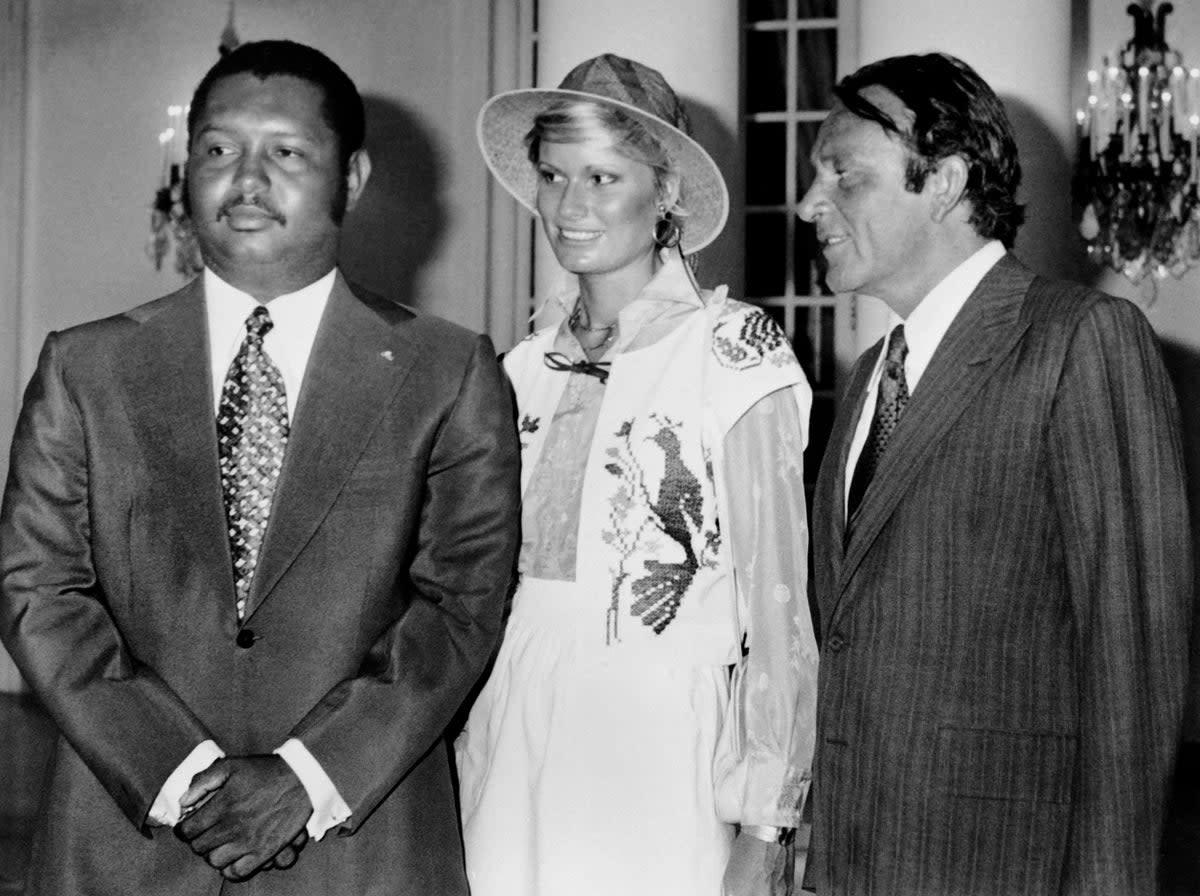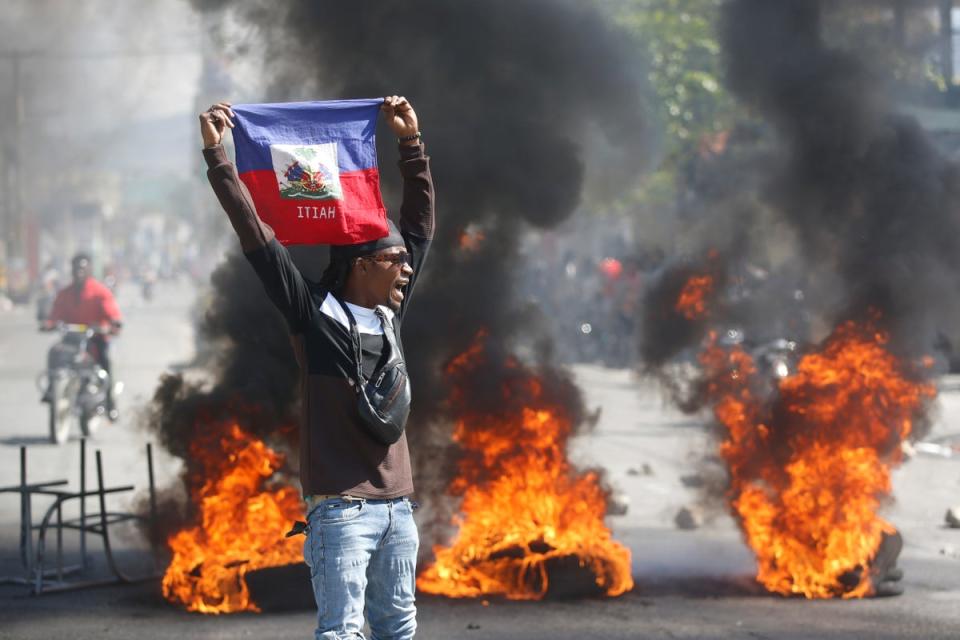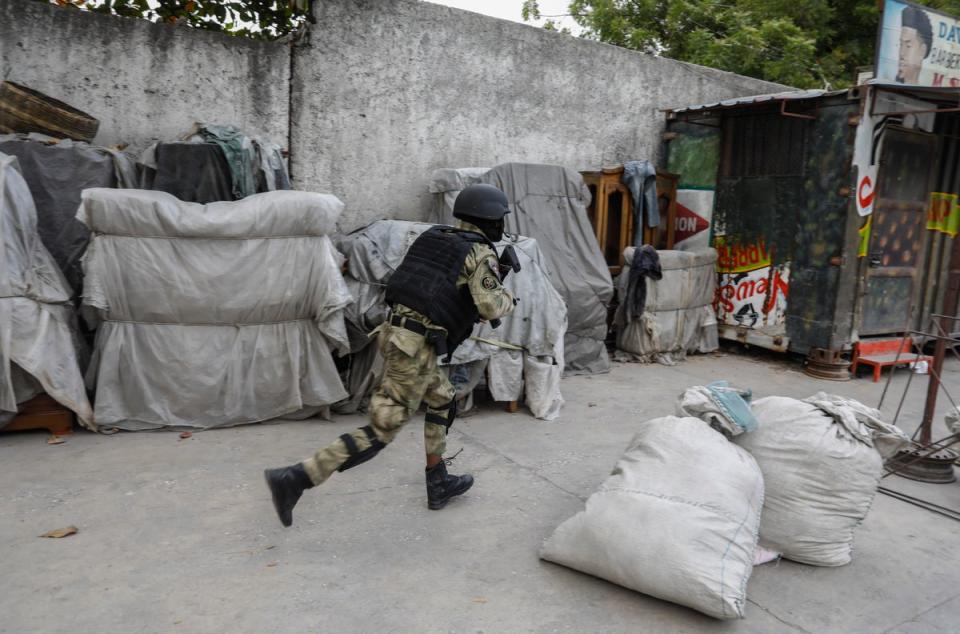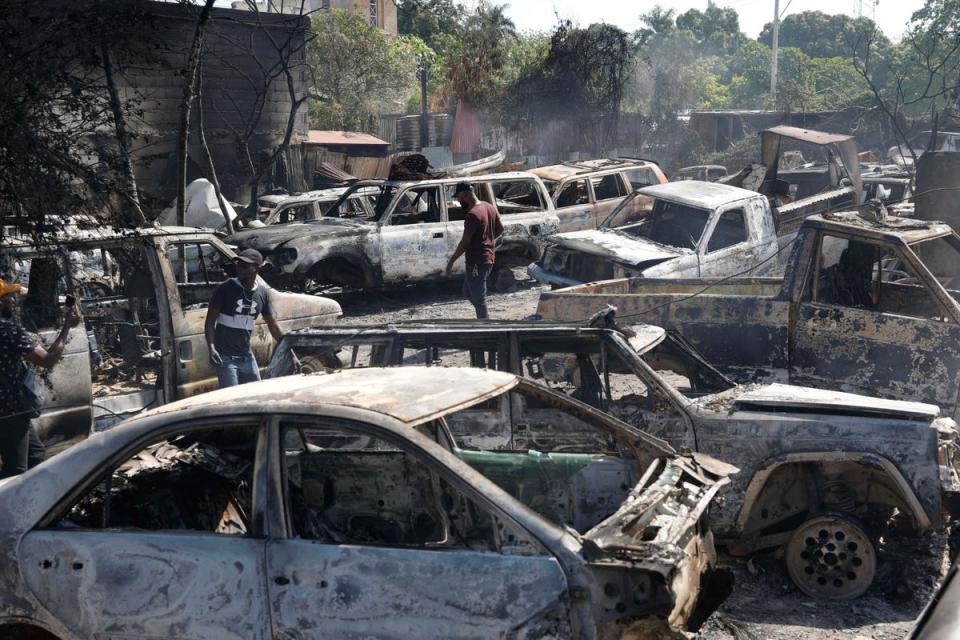Voices: Haiti was once the honeymoon destination for Hollywood’s elite. What happened?

- Oops!Something went wrong.Please try again later.
- Oops!Something went wrong.Please try again later.
- Oops!Something went wrong.Please try again later.
There was a time when Haiti was a favoured destination for the rich and famous. Richard and Elizabeth Taylor had one of their honeymoons there. Other visitors included Noel Coward, John Gielgud, Paulette Goddard and Irving Berlin. Mick Jagger and the broadcaster Barbara Walters came among a later generation of celebrities.
The names of the glitterati can be seen in the visitors book of the Grand Hotel Oloffson in the capital, Port-au-Prince. Graham Greene stayed while writing The Comedians, which brought the Haiti of Papa Doc Duvalier, and his murderous secret police, the Tonton Macoute, to a wider English-speaking readership.
The slide, which began with the repressive rule of Duvalier, who sought to strike terror into his subjects by identifying with Baron Samedi, the Vodou god of the dead, was never reversed. Papa Doc died in 1971, to be succeeded by his 19-year-old son, Jean Claude “Baby Doc” Duvalier. The descent into chaos continued.
Haiti is now essentially a failed state, with criminal gangs controlling more than 80 per cent of Port-au-Prince. According to the United Nations around 4,450 were killed in the last year – 1500 of them in the last three months. Another 1,700 were injured. The UN High Commissioner for Human Rights, Volker Turk, warned the that the “outrageous” levels of violence has brought Haiti to “ the brink of collapse”.
Many of those among the Haitian rich who have not already left the country have been holed up in recent weeks in their homes in Petionville, on a hill above the capital, listening to the echoes of gunfire and watching spreading flames as violence consumed the capital.
The gangs turned their baleful gaze up the hill to the affluent suburb of mansions, embassies and hotels which had so far managed to avoid the worst of the strife. Groups of young men arrived in their stolen motorcycles and cars, waving automatic rifles and machetes, intent on pillage and killing.
A bank, shops, cafes, petrol stations and a number of houses were looted in Petion-Ville and the adjoining districts of Laboule and Thomassin. But many of the residents had armed themselves and the security guards they employ in preparation for an attack. A vigilante group which had been increasingly active against the gangs, Bwa Kale, arrived to join in the fight.

Around 20 people were killed in the clashes which followed. Enraged locals burned and mutilated bodies, chopping off the hands of some who had been looting. Two gang leaders were killed in consecutive days – Makandal, and then Ernst Julme, aka Ti Greg, the head of Delmas 95, part of a gang coalition headed by Jimmy “Barbecue” Chérizier, the most well-known of the Haiti mobsters.
The police announced that they had shot dead Julme. The vigilantes of Bwa Kale are believed to have killed Makandal. The gangs vowed retribution: but their attempt to take over the areas they already control have been thwarted for now.
Jean-Philippe Louissant and his family had barricaded their home in Petionville. “We knew what was coming, we have been seeing what has been happening, and we had to be ready. These gang leaders are very bad men – they don’t just want to rob, they want to take over this city”, he said.
“There are dead bodies lying in the streets now. There is a war going on here, I don’t think people in the outside world understand that. It is getting impossible to exist like this. We will have to leave if things don’t improve. We don’t want to leave, but we may have to.”
Jean-Philippe, his wife Celeste, and their three children are discussing plans to move to Cap-Haitien in the north coast, which is still relatively calm, and then probably to Florida where they have relations living. But the road journeys to the coast are perilous, with armed bands ambushing cars to rob and take hostages.
There is an overwhelming feeling, say Haitians, that they are being abandoned to a grim fate. It has been six months since the United Nations, with Washington’s support, approved the sending of a military support mission. For the last three months warnings have come from neighbouring Caribbean and Latin American states that Haiti was close to collapse.
A transitional council will be formed in the next few days to form an administration until elections are held later in the year. António Guterres, the United Nations secretary general, welcoming the news, said he hoped this would pave the way for a more stable future.
But there is widespread perception that there is little that the transitional council will be able to do for now. People are continuing to vote with their feet. The US is evacuating its citizens by helicopter from Port-au-Prince to the Dominican Republic, which forms the island of Hispaniola with Haiti. The airport in Port-au-Prince has suspended operations after repeatedly coming under attack from gunmen.
The French government announced this week that it will bring out 170 of its citizens and 70 others from European Union states due to the continuing deterioration in security. Like the US operation, the evacuation will take place by helicopter.
The reason the airport was targeted, according to Barbeque and other gang leaders, was to prevent the acting president, Ariel Henry, from returning to Haiti. Henry, who had been asking for international security help for more than a year, had gone to Nairobi to negotiate the arrival of a Kenyan force. He is now in exile in Puerto Rico.
The last president, Jovenel Moïse, was assassinated in 2021. The acting president who followed him, Claude Joseph, was subsequently indicted over Moïse’s killing. Haiti, meanwhile, degenerated into ungoverned, chaotic space.
Haiti’s army was dissolved by a previous president, Jean-Bertrand Aristide. The only security presence now is a beleaguered police force which is struggling to protect what is left of the national institutions. They are only just managing to repulse an attempt to raid the country’s central bank this week. An armed mob has successfully stormed the two main prisons, allowing 4,400 inmates serving sentences for violent crimes – including murders, rapes and robberies – to stream out on to the streets. Ernst Julme, who died this week, was one of those freed.
The growing anarchy has been described by Unicef’s chief in Haiti, Catherine Russell, as a “scene out of Mad Max”. The Catholic bishops’ convocation in Port-au-Prince lamented that the country was being “reduced to rubble and ashes” with “moral codes breaking down”.
Rival criminal groups are carving out territories. There are no fewer than 200 gangs in the country, a hundred of them in Port-au-Prince alone. Many of them have historic ties with politicians and successive ruling regimes which have allowed them to recruit and build up arsenals with impunity.
The police complain that they are outgunned by the gangs. Garry John Baptiste, an official with the National Police Union, maintains that successes are being achieved despite lack of help from home and abroad.
“We are eliminating some important criminals now, the leaders – that is a good message to the gangs. But they have lots of weapons. We haven’t got enough rifles or equipment – 60 per cent of the police don’t even have bullet-proof vests. We have had so many of our members killed, and these are officers who are risking their lives for just $200 a month”.

There are growing calls in the US for intervention. James Foley, a former American ambassador to Haiti, points out that unless urgent steps are taken, the United States will face a failed state run by criminals and narco-traffickers about 700 miles from Florida.” Setting up a Transitional Council “is a race against time – and, in my view, it is unlikely to succeed, or even get international security forces into the country, without providing US military cover.”
For Jean-Philippe, living in Haiti is “like it was in Mogadishu”. The gang leaders, he held, were “like warlords – they want money and power”. The forming of the transitional council was a step in the right direction. But “people ask “where’s their army?’”.
I had met the Louissant family in 2010 while covering the devastating earthquake which had hit Haiti. A neighbour of his in Petionville had very kindly let me and colleagues from the Telegraph and the Guardian stay at their home – hospitality was much appreciated at a time when the few remaining hotels and guest houses remaining standing were full.
The earthquake, the “day of catastrophe”, claimed more than 220,000 lives, destroyed more than a quarter million homes and 30,000 commercial and industrial buildings. The poorest country in the Western hemisphere, with a history of natural and man-made disasters, brutal repression and endemic corruption, was reeling from what had befallen it.
The Louissants, however, refused to leave, determined, said Jean-Phillipe, to reopen the family’s factory and shops supplying electrical appliances. “We don’t want to abandon our workers, they depend on us, our customers depend on us”, he said. “Haiti will get economic help, there’ll be aid coming in, things will pick up and get much better.”
He was not the only one showing resilience. We saw the Brasserie Nationale d’Haïti, one of the country’s biggest beverage manufacturers, re-open and started rolling out its most popular product, Prestige beer. In Petionville, the Rivoli boutique repaired its showcases, to display one again Hermes scarves and Lacoste T-shirts, Tag-Heuer watches and Chanel perfume.
Elections later that year seemed to offer a firm path forward. Justice for human rights abuses of the past was due to take place with the trial of Jean-Claude Duvalier, who had returned to Haiti – but he died before facing trial.
Michel Martelly was a voted into power. A musician by profession, who split his time between Miami and Haiti, he entertained us journalists during the campaign with renditions of Creole Konpa music, and promised to root out corruption and integrate Haiti into the international community.
But hopes of a rebirth for the nation after the earthquake soon faded away. Most of the billions of dollars promised in aid from abroad did not materialise. A lot of what did arrive was misappropriated.
The old politics of Haiti were soon to resurface. Martelly had to step down in 2016 amid allegations of electoral fraud without a successor in place. He was subsequently sanctioned by the Canadian government for human rights abuse and involvement with criminal gangs. Elections held late that year brought Jovenel Moise to the presidency.
The justice system was breaking down. Kidnappings had jumped 72 per cent last year from the year before. It was not just the wealthy who were being abducted and held for ransom, but doctors, lawyers, academics. Many of the victims were routinely murdered if the payment was not made.
Noel Hypolite, a surgeon we saw working tirelessly treating patients after the earthquake, and who later helped set up a clinic for impoverished families, was among those who died. There had been a “misunderstanding”, his kidnappers acknowledged, about the location of the ransom drop. Dr Hypolite’s wife, a paediatrician, left with their family for Canada. Up to 25 per cent of medical staff are estimated to have left Haiti by the end of 2023.
Many Haitians feel now that salvation lies in international – preferably Western – intervention.

But foreign powers have left scars during the country’s history of two centuries. Haiti won its independence through a slave revolt which began in 1804 in what was then the French colony of Saint-Domingue, fighting off not just French forces but those of Britain and Spain.
The French isolated Haiti from the international community, demanding 150 million francs ($ 21 billion today) in reparation to lift the blockade. The penalty was reduced to 90 million francs after negotiations, but in 1914 no less than 80 per cent of Haiti’s budget was still going towards paying the debt.
The same year, 1914, US marines landed in Port-au-Prince and removed $ 500,000 in gold ($15 million today) from Haiti’s national bank to protect investment by Wall Street financiers. American forces returned a year later for two-decades of occupation. “I helped make Haiti a decent place for the National City Bank boys to collect revenues”, said the US commander Major General Smedley Butler.
Even the more benevolent deployment of a United Nations force after the 2010 earthquake brought misery. Infected sewage from their base led to 10,000 people in Haiti, cholera-free at that point, to die from the disease.
But in the current dire straits, many Haiti needs to look to the future, not the past. Jean Daniel Delone, an excellent journalist I worked with in Haiti, had been full of hope that the country would recover and stride forward from the calamities it had experienced. Now, he says, it is time to face reality.
“We are in a precarious situation. There is a shortage of water and food, and there is a desperate need for humanitarian aid”, he said. “We live close to places that suffer from gangs all the time. We can clearly hear the shooting; we’ll be in real trouble if they move in, already supplies can’t come in from the areas they’ve taken over.
“My son can’t go to school, the schools are shut. Markets, offices and factories are shut; all this leads to stress, there are bad psychological effects. With what is happening now, yes we are praying for international troops to come and help the police who are really stretched.”
Jean-Philippe Louissant agrees: “No country likes having foreign soldiers present. But we are in a desperate situation. For so many young men there are no jobs, no hope – but they have guns. What we need more than anything is security. If there is an explosion, it will not stay just in Haiti, it will spread through the region”.

